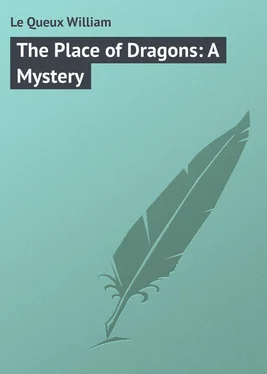William Le Queux - The Place of Dragons - A Mystery
Здесь есть возможность читать онлайн «William Le Queux - The Place of Dragons - A Mystery» — ознакомительный отрывок электронной книги совершенно бесплатно, а после прочтения отрывка купить полную версию. В некоторых случаях можно слушать аудио, скачать через торрент в формате fb2 и присутствует краткое содержание. Жанр: Классический детектив, foreign_detective, foreign_prose, на английском языке. Описание произведения, (предисловие) а так же отзывы посетителей доступны на портале библиотеки ЛибКат.
- Название:The Place of Dragons: A Mystery
- Автор:
- Жанр:
- Год:неизвестен
- ISBN:нет данных
- Рейтинг книги:5 / 5. Голосов: 1
-
Избранное:Добавить в избранное
- Отзывы:
-
Ваша оценка:
- 100
- 1
- 2
- 3
- 4
- 5
The Place of Dragons: A Mystery: краткое содержание, описание и аннотация
Предлагаем к чтению аннотацию, описание, краткое содержание или предисловие (зависит от того, что написал сам автор книги «The Place of Dragons: A Mystery»). Если вы не нашли необходимую информацию о книге — напишите в комментариях, мы постараемся отыскать её.
The Place of Dragons: A Mystery — читать онлайн ознакомительный отрывок
Ниже представлен текст книги, разбитый по страницам. Система сохранения места последней прочитанной страницы, позволяет с удобством читать онлайн бесплатно книгу «The Place of Dragons: A Mystery», без необходимости каждый раз заново искать на чём Вы остановились. Поставьте закладку, и сможете в любой момент перейти на страницу, на которой закончили чтение.
Интервал:
Закладка:
I knew we were confronted by one of the greatest criminal problems that had ever been offered for solution, calling for the most prompt, delicate and minute methods of investigation, if it was to be handled successfully. And as I contrasted the heavy, cumbrous, restricted conditions of English criminal procedure with the swift, far-reaching methods in use across the Channel, I felt that something of the latter was needed here if the mystery of Craig's death was ever to be solved.
CHAPTER VI
MYSTERY INEXPLICABLE
The town of Cromer was agog, when, next day, the coroner held his inquiry.
The afternoon was warm, and the little room usually used as the police court was packed to suffocation.
The jury – the foreman of which was a stout local butcher – having viewed the body, the inquest was formally opened, and Mrs. Dean, the first witness, identified the remains as those of her visitor, Mr. Edward Craig.
This, the first intimation to the public that Mr. Gregory was not dead after all, caused the greatest sensation.
In answer to the coroner, Mrs. Dean explained how, with his uncle, old Mr. Gregory, Craig had taken apartments with her. She had always found him a quiet, well-conducted young gentleman.
"Was he quite idle?" asked the grave-faced coroner.
"No. Not exactly, sir," replied the witness, looking round the closely packed room. "He used to do a good deal of writing for his uncle, more especially after the young man, Mr. Gregory's private secretary, had been over from Sheffield."
"How often did he come?"
"At intervals of a week or more. He always carried a small despatch-box, and on those occasions the three would sit together for half the day, doing their business, with the door closed – and," added the landlady vigorously, "Mr. Craig had no end of business sometimes, for he received lots of telegrams. From what I heard him say one day to his Uncle, I believe he was a betting man, and the telegrams were results of races."
"Ah, probably so," remarked the coroner. "I believe you have not seen the elder gentleman since the tragic evening of his nephew's death?"
"No, sir. The last I saw of Mr. Gregory was when he wished me 'good-night,' and went to bed, as was his habit, about half-past ten, on the night previous."
"And, where was the deceased then?"
"My servant Anne had taken up his hot water, and he had already gone to bed."
"And, did you find next day that the beds had been slept in?"
"Mr. Craig's had, but Mr. Gregory's hadn't," was the reply. Whereat the eager, listening crowd buzzed and moved uneasily.
The grave-faced county official holding the inquiry, having finished writing down the replies to his questions upon blue foolscap, looked across to the row of twelve tradesmen, and exclaimed in his sharp, brusque manner —
"Have the jury any questions to put to this witness?"
"I'd like to ask, sir," said the fat butcher, "whether this Mr. Gregory was not a very eccentric and extraordinary man?"
"He was," replied the good woman with a smile. "He always suspected that people was a-robbin' him. He'd strike out threepence from my weekly bill, and on the very same day, pay six or seven shillings for a pound of fresh strawberries."
"During the night you heard nobody leave your house?"
"No, neither me, nor my husband, heard any sound. Of course, our dog knew both of 'em, and was very friendly, so he'd make no noise."
"I would like to ask you, Mrs. Dean," said another juryman, the thin-faced manager of a boot-shop, "whether Mr. Craig was in the habit of receiving any strangers?"
"No," interrupted the coroner, "we are not here to inquire into that. We are here solely to establish the identity of the deceased and the cause of his death. The other matters must be left to the police."
"Oh! I beg pardon sir," ejaculated the offending juryman, and sat back in his chair with a jerk.
George Simmonds, a picturesque figure in his coast-guard uniform, was called next, and minutely described how he had found deceased, and had, from his dress, believed him to be old Mr. Gregory. Afterwards he was cross-examined by the foreman of the jury as to whom he had met during his patrol that night, and what he knew personally about the dead man.
"I only know that he was a very nice young gentleman," replied the coast-guard. "Both he and his uncle often used to pass the time o' day with us out against the flagstaff, and sometimes they'd have a look through the glass at the passing ships."
The police evidence then followed, and, after that Dr. Sladen, the chief medical man in Cromer, took the oath and made the following statement, in clear, business-like tones, the coroner writing it down rapidly.
"Henry Harden Sladen, Doctor of Medicine, 36, Cliff Avenue, Cromer. I was called to see deceased by the police, at about half-past four on the morning of the twelfth of June. He was lying upon a public seat on the East Cliff, and on examination I found that he had been dead about two hours or more."
"Any signs of violence?" inquired the coroner, looking up sharply at the witness, and readjusting his gold-rimmed glasses.
"None whatever."
"Yes, Dr. Sladen?"
"Yesterday afternoon," continued the witness, "I made a post-mortem examination in conjunction with Dr. Copping, of Cromer, and found the body to be that of a young man about twenty-five years old, of somewhat athletic build. All the organs were quite normal. There was an old wound under the left shoulder, apparently a bullet wound, and two rather curious scars on the right forearm, which, we agreed, had been received while fencing. We, however, could find no trace of disease or injury."
"Then to what do you attribute death?" inquired the coroner.
"Well, I came to the conclusion that the young man had been suddenly asphyxiated, but how, is a perfect mystery," responded the doctor. "It would be difficult to asphyxiate any one in the open air without leaving any mark of strangulation."
"I take it that you discovered no mark?"
"Not the slightest."
"Then you do not think death was due to natural causes?"
"It was due to asphyxiation – a rapid, almost instantaneous death it must have been – but it was not due to natural causes."
"Briefly put, then, you consider that the deceased was the victim of foul play?"
"Yes. The young man was murdered, without a doubt," replied the doctor, slowly. "But so ingeniously was the crime committed, that no trace of the methods by which death was accomplished has been left. The assassin, whoever he was, must have been a perfect artist in crime."
"Why do you think so?" asked the coroner.
"For several reasons," was the reply. "The victim must have been sitting upon the seat when suddenly attacked. He rose to defend himself and, as he did so, he was struck down by a deadly blow which caused him to stagger, reel, and fall lifeless some distance away from the seat. Yet there is no bruise upon him – no sign of any blow having been struck. His respiratory organs suddenly became paralysed, and he expired – a most mysterious and yet instant death."
"But is there no way, that you – as a medical man – can account for such a death, Dr. Sladen?" asked the coroner dryly.
"There are several ways, but none in which death could ensue in such circumstances and with such an utter absence of symptoms. If death had occurred naturally we should have been quickly able to detect the fact."
After one or two pointless questions had been put to the witness by members of the jury, his place was taken by his colleague, Dr. Copping, a pushing young medico who, though he had only been in Cromer a year, had a rapidly-growing practice.
In every particular he corroborated Dr. Sladen's evidence, and gave it as his professional opinion that the young man had met with foul play, but how, was a complete mystery.
Читать дальшеИнтервал:
Закладка:
Похожие книги на «The Place of Dragons: A Mystery»
Представляем Вашему вниманию похожие книги на «The Place of Dragons: A Mystery» списком для выбора. Мы отобрали схожую по названию и смыслу литературу в надежде предоставить читателям больше вариантов отыскать новые, интересные, ещё непрочитанные произведения.
Обсуждение, отзывы о книге «The Place of Dragons: A Mystery» и просто собственные мнения читателей. Оставьте ваши комментарии, напишите, что Вы думаете о произведении, его смысле или главных героях. Укажите что конкретно понравилось, а что нет, и почему Вы так считаете.












